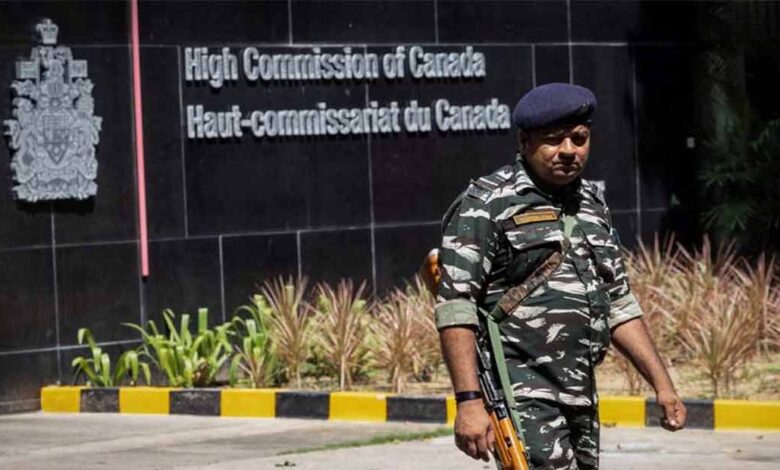
Canada is making adjustments to its diplomatic staff presence in India, and New Delhi is suspending visa services in Canada as tensions escalate over the murder of a Canadian citizen.
Prime Minister Justin Trudeau shocked the House of Commons by revealing on Monday that there is “credible” intelligence suggesting potential links between agents of Indian Prime Minister Narendra Modi’s government and the killing of Hardeep Singh Nijjar, a 45-year-old Sikh leader who advocated for the Khalistan movement. Nijjar was fatally shot on June 18 outside the Guru Nanak Sikh Gurdwara in Surrey, B.C. Trudeau did not provide further details on the evidence gathered by Canadian intelligence agencies.
India vehemently denied the allegations and accused Canada of harboring “Khalistani terrorists and extremists.” It also issued a warning to its citizens in Canada to exercise caution due to what it termed “anti-India activities” in the country. As a result of this diplomatic dispute, both nations have expelled each other’s diplomats.
In response, New Delhi’s visa processing center in Canada has temporarily halted its services. Similarly, Ottawa is modifying its diplomatic presence in India because some of its staff have received threats on various social media platforms, according to Global Affairs Canada.
Out of an abundance of caution, Global Affairs Canada has decided to temporarily adjust staff presence in India while ensuring that diplomats and locally-engaged staff are available to maintain business and operational continuity. Canada’s high commission and all consulates remain open, and Canada expects India to uphold the security of its diplomats and consular officers under the Vienna Convention.
Meanwhile, the BLS Indian Visa Application Center’s website announced that visa services are suspended indefinitely, citing “operational reasons.”
Arindam Bagchi, a spokesperson for India’s foreign ministry, explained that this suspension is due to the “security situation” in Canada. All categories of visas, including e-visas, are affected by this suspension.
In 2021, 80,000 Canadian tourists visited India, making them the fourth largest group of tourists, according to India’s Bureau of Immigration.
India’s External Affairs Ministry issued an updated travel advisory urging its citizens in Canada, especially those studying there, to exercise caution due to “growing anti-India activities and politically condoned hate-crimes.” The advisory also suggests avoiding venues in Canada where threats have targeted Indian diplomats and members of the Indian community opposing anti-India activities.
Canada’s Public Safety Minister, Dominic LeBlanc, refuted these claims and reaffirmed Canada’s status as a safe country.
Hardeep Singh Nijjar was actively involved in organizing an unofficial referendum among the Sikh diaspora to seek independence from India at the time of his assassination. He had consistently denied India’s accusations of terrorism.
The second stage of voting in British Columbia on whether to establish a Sikh homeland in India’s Punjab province is scheduled for October 29.
The Vancouver Police Department has increased security around India’s Consulate following Trudeau’s announcement.
Although there have been no specific threats against Indian consular officials, Vancouver police have heightened their presence at the downtown Vancouver consulate as a precaution.
The demand for an independent Sikh homeland, known as Khalistan, originated as an insurgency in India’s Punjab state in the 1970s but was suppressed in a government crackdown. Despite losing much of its political power, the movement still has supporters in Punjab and among the overseas Sikh diaspora.
The modern Sikh independence movement traces back to the 1940s but gained momentum in the 1970s and 1980s. In 1984, then-Prime Minister Indira Gandhi ordered a military operation to capture armed separatists in Sikhism’s holiest shrine, resulting in numerous casualties. In retaliation, her Sikh bodyguards assassinated her. Subsequently, anti-Sikh riots occurred across India, leading to the deaths of many Sikhs.
Though the insurgency was quashed long ago, the Modi government has alleged that Sikh separatists are attempting a resurgence. India has urged several countries, including Canada, Australia, and the United Kingdom, to take legal action against Sikh separatists.
India has also expressed concerns about frequent demonstrations and alleged vandalism by Sikh separatists and their supporters at Indian diplomatic missions in Canada, Britain, the U.S., and Australia, requesting better security from local governments.
Ottawa has maintained that freedom of speech allows groups to voice political opinions as long as they do not resort to violence. The Canadian government has denounced threats to Indian diplomats by these groups and offered 24/7 security to the envoys, as stated by Foreign Affairs Minister Melanie Joly on September 14.
The expulsion of diplomats has further escalated tensions between the two nations. Trudeau had strained interactions with Modi during the G20 meeting in New Delhi earlier this month, and Canada subsequently canceled a planned trade mission to India in the fall.
Despite the diplomatic dispute, Canada remains a top destination for Indian students, with nearly 300,000 Indian students pursuing higher education there in 2022.








































